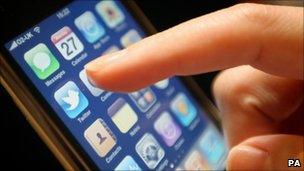Nokia’s patent victory against Apple
- Published
- comments

Nokia claimed some technology in the iPhone infringed its patents
At last, a victory for Nokia against Apple. The settlement of the long-running and complex patent battle between the two technology giants is a rare piece of good news for the Finnish company - and its shares hauled themselves off the canvas this morning as a result.
But what this story really shows once again is how one phone, the iPhone, has proved the undoing of a company whose dominance seemed unassailable just four years ago.
When Steve Jobs unveiled the touchscreen device in 2007, Nokia seemed relaxed about Apple's arrival in the market - it was after all only going to be a niche player, serving the tiny segment of the market interested in smartphones.
Nokia was the industry's acknowledged leader, not just in market share but in innovation. Just look at two videos, put on YouTube, external a few days after the iPhone launch.
They show a couple of concept phones, apparently promising, external a far more sophisticated touchscreen future than Apple was offering.
A caption says the videos "are exploring futuristic concepts and potential new ideas that may or may not be produced in years to come."
The trouble was, for all the ideas, Nokia failed to turn the inventiveness of its engineers into one compelling product in the same way that Apple managed with the iPhone.
As first Apple, then Google's Android, showed that easy access to the mobile internet was the future of phones, the giant of the industry appeared asleep at the wheel.
So in 2009 the Finnish firm launched its patent broadside, accusing Apple of trying to get a free ride on its innovation with the iPhone.
Among the technologies it accused Steve Jobs and his team of "borrowing" were wireless data, speech coding, security and encryption.
Now the patent battle has been sorted. Apple's statement talks of an agreement on "a license covering some of each others' patents, but not the majority of the innovations that make the iPhone unique." But, as Apple is paying royalties to Nokia, it seems clear who is the overall winner.
Nokia may now hope to reach more licensing agreements with other phone-makers, and we should not underestimate just how lucrative the patents on all that technology developed in Finland over the last decade could still prove.
Stephen Elop has been struggling to convince the market that his campaign to get Nokia off its "burning platform" and into a profitable future making Windows Phone 7 handsets is on course.
Now he has won a breathing space, with the Apple deal promising a slight lift in Nokia's dismal financial performance.
But Nokia's CEO should be more focussed on driving home the lesson of the iPhone. It's not enough to invent cutting-edge technology, it's not enough to be able to predict what consumers will want a couple of years ahead.
You need the design and marketing skills to combine hardware and software into a product that will make people go "wow", rather than "whatever".